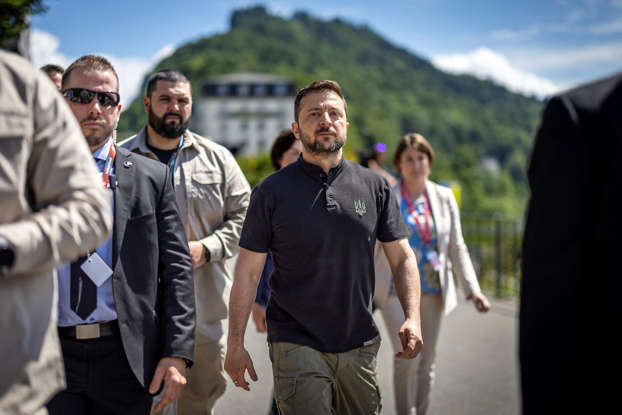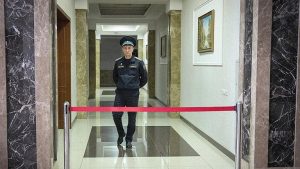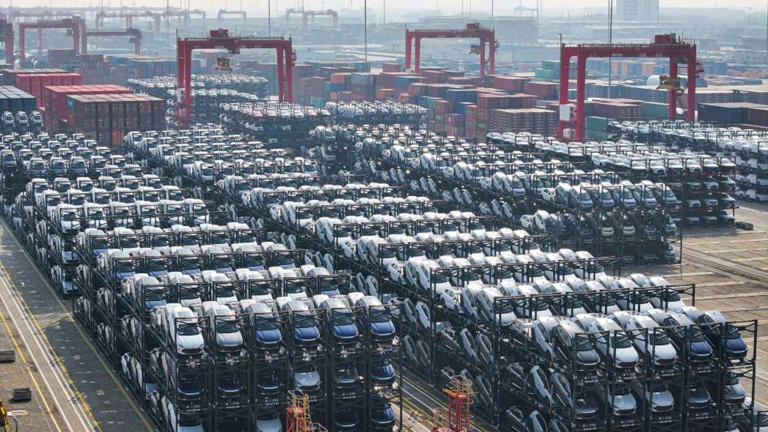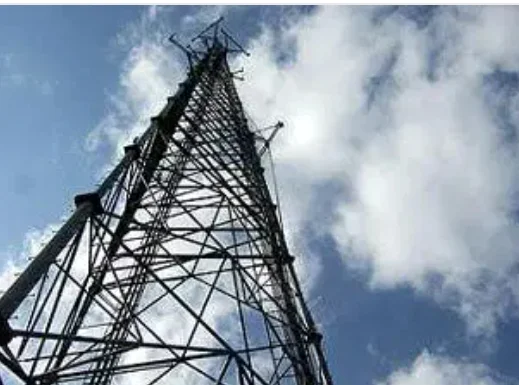News
Zelensky reveals one condition to give up territory as war intensifies
Published
5 months agoon
By
Ekwutos Blog
Ukrainian President Volodymyr Zelensky has been adamant that his country would not trade any territory in exchange for peace with Russia and Vladimir Putin, but recent remarks might be a sign that this blanket policy has changed.

A Russian Federal Bailiffs Service officer guards a corridor leading to a courtroom inside the court in Yekaterinburg, 18 July 2024
© AP Photo/Dmitri Lovetsky
In a rare public display of Russian secret agents, state television Russia-1 interviewed two former spies who returned to Moscow as part of the US-Russia prisoner swap.
Artem Dultsev and Anna Dultseva were posing as Argentinian citizens after settling in Slovenia in 2017. The duo reportedly used their residence in the Slovenian capital, Ljubljana, to travel to other NATO and EU member states.
In the interview, the Russian reporter presented a bag with stuffed toys to the children and asked their parents how to say “Cheburashka”, a character from Soviet and Russian cartoons, in Spanish.
Allegedly, the two children were not aware of their parents’ true identity and did not speak their native tongue.
In the interview, Dultseva explained how she similarly did not think or speak in Russian, and faced difficulty adopting the language back upon her return to Moscow.
The couple’s two teenage children lived in foster care after their parents’ arrest in 2022 and, according to Dultseva, were almost placed for adoption.
“We were threatened that the Argentinian side allegedly wanted to take our children. The children could be given to another family for adoption,” Dultseva said.
“But we felt that the Slovenian special services also did everything possible to keep the children in Slovenia to keep us together.”
Yashin: People’s support ‘my source of strength’
Meanwhile, one of the political activists released by the Kremlin, Ilya Yashin, thanked his supporters via a stream on his YouTube channel. He said he felt empowered after receiving around 30,000 letters and postcards and added: “it was literally my source of strength, because not a single day in prison did I feel abandoned, forgotten, or alone.”
The Russian activist previously admitted that he felt burdened by his release, as many of his comrades remain behind bars. Yashin spoke about the details of the prison swap and said that two more Russian dissidents should have been released as part of the deal.
“The Russian side deceived, betrayed their counterparts in the negotiations, leaving (Russian opposition activist Alexei) Gorinov and (associate of late Russian opposition leader Alexei Navalny, Daniel) Kholodny actually hostage,” Yashin said.
Yashin was imprisoned in 2022 for criticising Russia’s full-scale invasion of Ukraine. In his livestream, he vowed to stay committed to his anti-war position.
He added that he spoke to a German government official and warned, “if you allow Putin to devour Ukraine now, he will 100% move on. There are no illusions.”
Russia did not turn a corner, experts say
The prisoner swap between Russia and the West is the largest exchange since the Cold War, but the CEO of the Committee to Protect Journalists, Jodie Ginsberg, warned of the precedent it might set for future governments.
“Our concern is that this doesn’t set a precedent for future governments to feel that they can simply take innocent journalists, for example, imprison them and use them as bargaining chips for the release of, prisoners abroad.”
Ginsberg warns that the swap does not signify an improvement in press freedom in Russia. “This doesn’t mean that Russia has turned a corner or that Russia now suddenly has press freedom”.
She adds that the country was the fourth largest jailer of journalists worldwide in 2023, making it one of the most restrictive environments for journalists globally.
You may like


Beijing ‘firmly opposes’ US ban on smart cars with Chinese tech


POWA PRESIDENT PROMISES BETTER WELFARE FOR POLICE WIDOWS, ORPHANS Slates Visits to Imo, Abia State Commands


New Match of the Day presenters announced


Spain hosted record 94 mn foreign tourists in 2024


Record 36.8 million tourists visited Japan in 2024


ASUU kicks against Senate attempt to dismantle the Tertiary Education Trust Fund (TETFund) through the proposed tax reform bill.
Business
Beijing ‘firmly opposes’ US ban on smart cars with Chinese tech
Published
2 hours agoon
January 15, 2025By
Ekwutos Blog
Beijing on Wednesday said it “firmly opposes” a US move to effectively bar Chinese technology from smart cars in the American market, saying alleged risks to national security were “without any factual basis”.
“Such actions disrupt economic and commercial cooperation between enterprises… and represent typical protectionism and economic coercion,” foreign ministry spokesman Guo Jiakun said, adding: “China firmly opposes this.”
Tuesday’s announcement in the United States, which also pertains to Russian technology, came as outgoing President Joe Biden wrapped up efforts to step up curbs on China, and after a months-long regulatory process.
The rule follows an announcement this month that Washington is mulling new restrictions to address risks posed by drones with tech from adversaries such as China and Russia.
US Commerce Secretary Gina Raimondo said that modern vehicles contain cameras, microphones, GPS tracking and other technologies connected to the internet.
“Cars today aren’t just steel on wheels — they’re computers,” she said.
“This is a targeted approach to ensure we keep PRC and Russian-manufactured technologies off American roads,” she added, referring to the People’s Republic of China.
But Guo slammed the move, telling journalists in Beijing that China would “take necessary measures” to safeguard its legitimate rights and interests.
“What I want to say is that the US, citing so-called national security, has restricted the use of Chinese connected vehicle software, hardware, and entire vehicles in the United States without any factual basis,” he told a regular press conference.
“China urges the US to stop the erroneous practice of overgeneralising national security and to stop its unreasonable suppression of Chinese companies.”
‘Trying to dominate’
The final US rule currently applies just to passenger vehicles under 10,001 pounds (about 4.5 tonnes), the Commerce Department said.
It plans, however, to issue separate rulemaking aimed at tech in commercial vehicles like trucks and buses “in the near future”.
For now, Chinese electric vehicle manufacturer BYD, for example, has a facility in California producing buses and other vehicles.
National Economic Advisor Lael Brainard added that “China is trying to dominate the future of the auto industry”.
But she said connected vehicles containing software and hardware systems linked to foreign rivals could result in misuse of sensitive data or interference.
Under the latest rule, even if a passenger car were US-made, manufacturers with “a sufficient nexus” to China or Russia would not be allowed to sell such new vehicles incorporating hardware and software for external connectivity and autonomous driving.
This prohibition on sales takes effect for model year 2027, and also bans the import of the hardware and software if they are linked to Beijing or Moscow.
Business
FG To Blacklist 18 Banks, Reason Emerges
Published
2 days agoon
January 13, 2025By
Ekwutos Blog
The Federal Government is set to release the names of 18 banks owing Nigerian telecom operators nearly ₦200 billion in Unstructured Supplementary Service Data (USSD) charges.
This debt, accumulated over several years, has remained unresolved despite persistent demands for payment from the telcos.
The move, expected to be announced tomorrow, appears to be aimed at compelling the telcos to cease providing USSD services to these banks.
These services enable seamless online banking for millions of customers across the country.
Telcos have also issued threats of a telecom blackout in nine states, intensifying concerns about the implications of this standoff on banking and communication services nationwide.
Business
Windfall tax: Nigerian banks dare FG over remittance
Published
3 days agoon
January 13, 2025By
Ekwutos Blog
Nigerian banks and the federal government, through the Federal Inland Revenue Service, have been enmeshed in disagreement over how much should be paid in a one-off foreign exchange windfall tax, two weeks after an initial deadline elapsed.
Recall that President Bola Ahmed Tinubu in July 2024 sought lawmakers’ approval for a 50 percent tax on banks’ realised foreign exchange gains following the naira devaluation on June 14, 2023.
Thereafter, both chambers of the National Assembly passed the bill seeking the one-off tax, called the wildfall tax, with the Senate raising the rate to 70 percent.
Nigerian top-tier banks were to be debited by the CBN on December 31, 2024, for the windfall tax.
However, Business Day on Monday reports that barely two days after the deadline, Nigerian banks are yet to give in on the windfall tax implementation.
The banks and the FIRS, however, can’t seem to agree on the tax due, two weeks after the payment deadline.
“The banks are having a quiet tango with the FIRS on the windfall tax issue at the moment,” a source familiar with the matter told Business Day.
“The banks are arguing with the FIRS on the calculated sums of tax due and are reverting with their own calculations based on the same principles the FIRS is basing its numbers on.
“All banks were going to be debited on December 31 by the CBN based on FIRS numbers, but the coordinating minister of the economy said no.
“Most of the banks now live in fear of being hammered anytime from now by the CBN based on whatever FIRS wants to do,” the source further said.
The windfall tax comes as the Nigerian banks benefit from Tinubu’s foreign exchange reform in 2023, which led to an initial 40 percent devaluation of the currency.
Four of Nigeria’s five largest banks recorded huge foreign exchange revaluation gains in 2023, with First Bank of Nigeria Holdings the only exception.
To this end, reports have it that Access Bank, Zenith Bank, Guarantee Trust Bank, and United Bank for Africa saw their combined gross earnings more than double to N8 trillion in 2023.
Similarly, profit before tax for the four banks jumped more than two-fold to N2.9 trillion, according to the results declared for the year.
Gains made from currency revaluation account for as much as a third or more of their entire profit for the year under consideration, according to the credit-rating agency Moody’s, which covers the top nine Nigerian lenders.
The Chairman of the Federal Inland Revenue Service, Zacch Adedeji, in July said the windfall tax is a recovery plan to balance the Nigerian economy.
This comes amid the opposition by stakeholders in the banking sector.
However, Femi Otedola, the chairman of FBNH, whose bank was not affected, backed the federal government on the implementation of the windfall tax.
The tax will see the federal government rank in 70 percent of the N3.7 trillion FX gain by banks in 2023.

Beijing ‘firmly opposes’ US ban on smart cars with Chinese tech

POWA PRESIDENT PROMISES BETTER WELFARE FOR POLICE WIDOWS, ORPHANS Slates Visits to Imo, Abia State Commands

New Match of the Day presenters announced
Trending
- Politics11 months ago
Nigerian Senate passes Bill seeking the establishment of the South East Development Commission.

 Business11 months ago
Business11 months agoInflation hits record high of 29.90% on naira weakness

 Politics8 months ago
Politics8 months agoBREAKING: Federal Gov’t Offers To Pay Above N60,000, Reaches Agreement With Labour

 SportsNews10 months ago
SportsNews10 months agoOlympic Qualifiers 2024: CAF Confirms Dates For Super Falcons Vs Banyana Banyana

 Politics10 months ago
Politics10 months agoGovernor Hope Uzodinma’s New Cabinet In Imo: The Gainers, The Losers

 Trending3 months ago
Trending3 months agoNYA demands release of ‘abducted’ Imo chairman, preaches good governance
- Business3 months ago
US court acquits Air Peace boss, slams Mayfield $4000 fine
- Entertainment11 months ago
American Singer Beyonce makes history as first Black woman to top country chart

